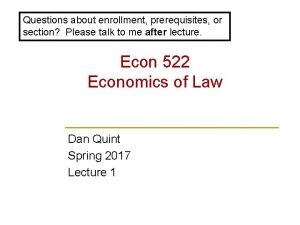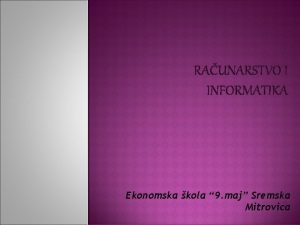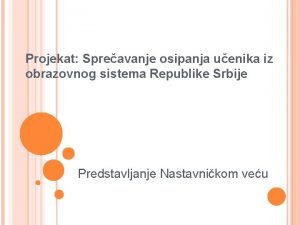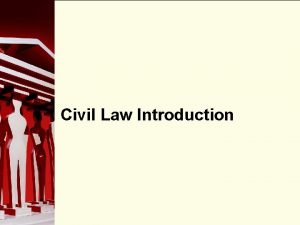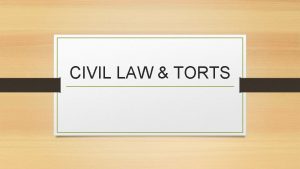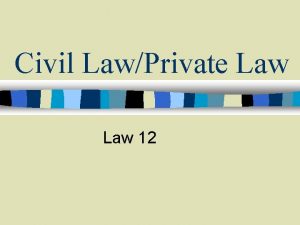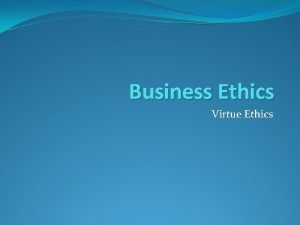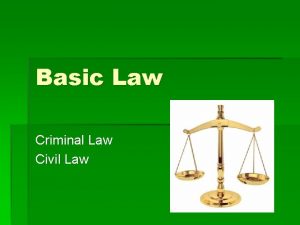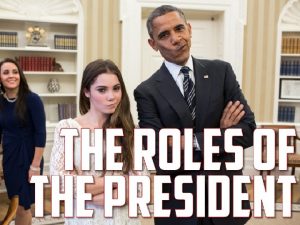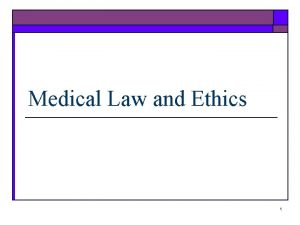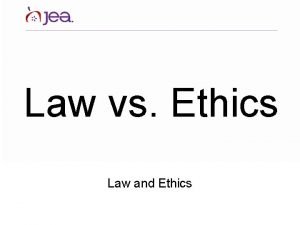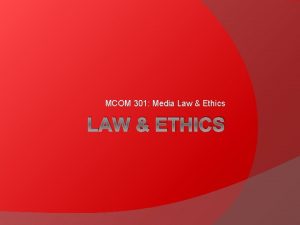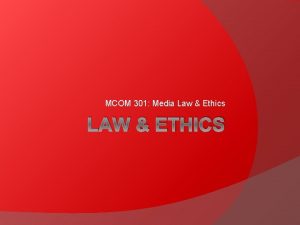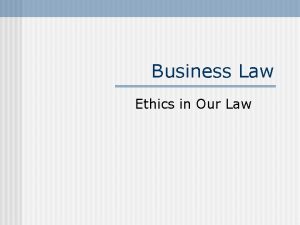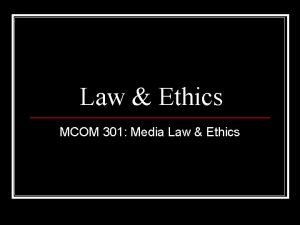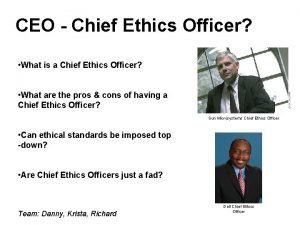Ethics Training Maj Larry Lohman Chief Civil Law





























- Slides: 29

Ethics Training Maj Larry Lohman Chief, Civil Law & Ethics 9 AF/USCENTAF/JA

G S I F T S All ethics rules operate on the appearance standard, meaning … If it looks bad, it is bad.

The rules on the acceptance of gifts are with a few exceptions, the same for all agencies in the Executive Branch. Everyone in Do. D must be aware of the restrictions in order to avoid inadvertent mistakes that could ruin a career. As decision-makers, we all perform official duties that outsiders may want to unfairly influence. As public servants, we must not allow even the appearance of impropriety.

Prosecution ! Stars and Stripes, September 2002 SSgt Christopher Mc. Guire (48 CONS, Lakenheath, UK) Will spend three months behind bars for accepting a $15, 000 bribe from a contractor while he was deployed as a CCO during AEF 4&5, March through June 2001. While deployed at PSAB, Mc. Guire negotiated a $373 K contract for the purchase of a cold-storage warehouse, in return, the contractor (Abdullah Trading) gave Mc. Guire $15 K, three valuable carpets and a rugby ball. Was it worth it? I don’t think so! Mc. Guire was ordered to forfeit $500 per month for 35 months, and was reduced to the rank of A 1 C.

Gift Acceptance Analysis 1) Is it (a) from a prohibited source, or (b) offered because of your official position? 2) Is it defined as a “gift”? 3) Is there an exception? 4) Is there a limitation on using the exception?

General Gift Rule An employee shall not solicit or accept any gift or other item of monetary value - From a prohibited source; or - Given because of the employee’s official position

5 CFR 2635 prohibits employees from soliciting or accepting anything of value from a prohibited source. Even if the contributor is not a prohibited source, you are not allowed to accept a gift that is offered because of your official position (acting on behalf of the federal government).

Prohibited Sources Any person 1) seeking official action from, doing business with, or conducting activities regulated by, the individual’s employing agency; or 2) whose interests may be substantially affected by the performance or nonperformance of the individual’s official duties D E F I N I T I O N

A “prohibited source” is any entity (or any entity with a majority of its members) who: 1. Seeks official action from your agency (e. g. , the Boy Scouts, the USO, or the Red Cross) 2. Does business or seeks to do business with your agency (e. g. , a defense contractor) 3. Conducts activities regulated by your agency (e. g. , if you work for the Corps of Engineers, then any entity that wants to drain wet lands) 4. Has interests that may be substantially affected by your performance or nonperformance of official duties (e. g. , if you are a procurement officer, then the contractor you deal with).

Gifts • Modest items of food and refreshment, such as coffee, donuts, etc. • Greeting cards and items with little inherent value, (i. e. , plaques, certificates, etc. ) • Opportunities and benefits offered to the public (military discounts, etc. ) • Rewards and prizes to competitors • Anything paid for by the Government or by the employee

Travel Benefits (31 USC 1353) When an employee is in a travel status, and when there is no conflict of interest, an agency may accept on behalf of the Government: • Travel and other actual expenses • Lodging, meals, and free attendance • Travel expenses for accompanying spouse when approved by the travel approving authority

Under 31 USC 1353, the Head of Do. D Components may accept, on behalf of the Government, travel benefits incurred by an employee in a travel status when: • Acceptance is approved in advance by the travel approving authority, who must determine the payment is: - for travel related to official duties, - for attendance at a meeting or similar function, and - from a non-Federal source that is not disqualified on conflict of interest grounds. • You must report in writing to your ethics counselor any acceptance by your Component of travel benefits related to your official travel, or if you are in a “travel status” when you are out of the city where you are assigned or, if not in a city, when you are off the installation.

Gifts to the Government (10 USC 2601 and 2608) The Secretaries of Defense, Army, Navy, and Air Force may accept, on behalf of the Government, gifts to their agency

10 USC 2601 and 2608 give the Secretaries of Defense, Army, Navy, and Air Force the authority to accept gifts of money and property on behalf of the Government. Monetary gifts are deposited with the U. S. Treasury, sometimes in special accounts upon which the agency may draw. This authority may be used to allow the acceptance of unsolicited travel benefits when 31 USC 1353 does not apply (e. g. , to cover the travel costs of flight crews at air shows).

Gift Exceptions to the gift acceptance prohibition

Now that we’ve defined what a gift is and is not, let’s examine exceptions to the gift acceptance prohibition. As you do your analysis with regard to accepting a gift, remember that even when a gift exception could allow you to accept, it is never inappropriate and is frequently prudent to decline a gift offered by a prohibited source or because of your official position. Also, there may be limitations on applying the exceptions.

Gift Exceptions • Gifts of up to $20, up to $50 per year from the same source • Discounts and similar benefits

• You may accept gifts (other than cash or investment interests) up to $20 per occasion, if the aggregate market value received from one source under this exception does not exceed $50 in a year. You may not pay the amount that exceeds the $20 limit, but may decline any distinct item in order to make the aggregate $20 or less (I. e. , pay $5 and then accept a gift worth $25). You are responsible for keeping track of the gifts you receive regarding the $50 limit per year. • You may accept reduced membership or other fees offered to all Government employees or all military personnel by professional organizations if the only restriction on membership is professional qualifications. You may accept opportunities, benefits, favorable rates, and commercial discounts offered

Gift Exceptions, cont. Mr. and Mrs. Invitee Defense Pentagon Washington, D. C. • Social invitations from other than prohibited sources • Speaking engagements and widely attended gatherings

• You may accept food, refreshments, and entertainment, not including travel or lodgings, at a social event attended by several people where the invitation is from a person or entity that is not a prohibited source, and there is no fee charged to any person attending the event (e. g. , you are invited, along with several others, by J. R. R. Tolkien to the premier of his latest movie). • When you are assigned to participate as a speaker or panel member, or otherwise to present information on behalf of the agency at a conference or other event in your official capacity, you may accept an offer of free attendance at the event on the day of your presentation when provided by the sponsor of the event. • When there has been a determination that your attendance in your personal capacity is in the interest of the agency because it will further agency programs or operations, you may accept an unsolicited gift of free attendance to a widely attended gathering of mutual interest to a number of parties when provided by the sponsor of the event. - Your Agency Designee (your supervisor) may authorize you to accept a sponsor’s invitation to your spouse to participate.

Gift Exceptions, cont. • Gifts accepted under specific statutory authority JER • Gifts authorized by supplemental agency regulation

Gifts from Foreign Governments (5 USC 7342) • Whenever possible, Do. D employees shall decline gifts from foreign governments • Gifts from foreign governments may be accepted to avoid embarrassing or giving offense to the donor – Gifts of minimal value (currently not more than $305) may be retained – Gifts of more than minimal value become the property of the U. S. Government

Limitations on Exceptions There are five limitations on the use of gift acceptance exceptions “C’mon, c’mon it’s one or the other. ”

NOTWITHSTANDING ANY EXCEPTION, YOU SHALL NOT: 1) Accept a gift in return for being influenced in the performance of an official act. 2) Solicit or coerce the offering of a gift. 3) Accept from the same or different sources on a basis so frequent that a reasonable person would be led to believe you are using your office for private gain. 4) Accept a gift in violation of any statute (such as accepting a supplementation of your federal salary from a nonfederal source for performing your official duties). 5) Accept vendor promotional training contrary to applicable regulations.

Gifts to Supervisors “Superior” means your supervisor, your supervisor’s supervisor, and everyone up the chain of command. “Gift” does not include cards, plaques or certificates if they have little or intrinsic value. An employee may not give a gift to a superior, except: - Under the rule for occasional gifts (e. g. birthday, promotion, hospitality, etc. ) and it’s under $10. - Under the rule for special occasion gifts (infrequent and significant personal occasions: marriage, PCS, retirement, etc. ) there’s no dollar limit, just “appropriate”

Special Occasion Gifts Group Gift(s) - Organizers will not solicit contributions of more than $10. 00 - The market value of the gift cannot exceed $300. 00 - The cost of food, refreshments & entertainment provided to the employee and personal guests to mark the special occasion does not count toward the $300. 00 limit

Misuse of Position and Government Property - Official time is for performance of official duties. - May not ask or direct subordinates to use official time for other than official duties. - May not use non-public information to further your own private interests, or the private interests of others. - Generally, not allowed to use government property for other than authorized purposes (Computers, government owned vehicles, etc. ).

Financial Disclosure OGE Form 450, Confidential Financial Disclosure Report - Must complete if your duties involve decision-making or significant judgment in contracting and procurement (i. e. , our warranted Contracting Officers). - Form to be completed within 30 days after entering such position and every October or November. - Completed form is seen only by ethics counselor (JAG official) and supervisor. - Stored in a sealed envelope for 6 years. -- Contrast with SF 278, which is a public document.

Do you have any questions? There are JAGs in most deployed locations; please see one if you have specific questions while you are deployed
 Witaj majowa jutrzenko - tekst
Witaj majowa jutrzenko - tekst Witaj majowa jutrzenko
Witaj majowa jutrzenko Witam 3 maja
Witam 3 maja Witaj maj trzeci maj tekst
Witaj maj trzeci maj tekst Witaj maj trzeci maj tekst
Witaj maj trzeci maj tekst Lesson 3 commander in chief and chief diplomat
Lesson 3 commander in chief and chief diplomat Difference between civil law and criminal law
Difference between civil law and criminal law Criminal law plaintiff
Criminal law plaintiff Common law and civil law
Common law and civil law Examples of civil law
Examples of civil law International contracts
International contracts Civil rights webquest
Civil rights webquest Chief data officer training
Chief data officer training Newton's first law and second law and third law
Newton's first law and second law and third law Newton's first law
Newton's first law Boyles law
Boyles law Avogadro's law constants
Avogadro's law constants Cezary maj pł
Cezary maj pł Cezary maj pł
Cezary maj pł Zera i bieguny filtru
Zera i bieguny filtru Vitaj máj
Vitaj máj Ekonomska skola 9 maj sremska mitrovica smerovi
Ekonomska skola 9 maj sremska mitrovica smerovi Prehepaticus
Prehepaticus Portret hrvatski jezik
Portret hrvatski jezik Maj 2004 biologi
Maj 2004 biologi Sgt. john kenneth ferrier
Sgt. john kenneth ferrier Mindstekrav matematik htx
Mindstekrav matematik htx Tehnicka skola 23 maj pancevo
Tehnicka skola 23 maj pancevo Zone opasnosti
Zone opasnosti Jakub maj
Jakub maj









